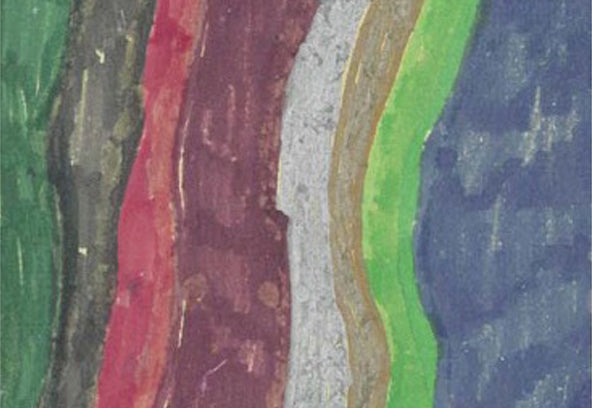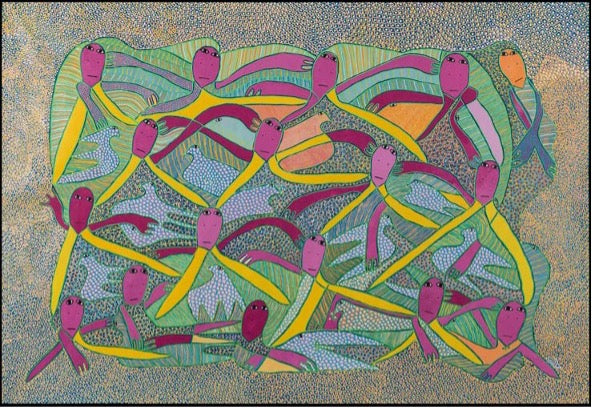ニット
今シーズンはハイチのアーティスト、Levoy Exil とコラボレーションしました。
ルヴォイは、サン・ソレイユ芸術運動で重要な役割を果たしたことで知られる、著名なハイチ人アーティストです。1972 年に芸術家としての道を歩み始め、1973 年に著名なアーティストのティガが始めたサン・ソレイユ ワークショップに参加しました。この画期的な試みにより、それまで芸術に触れたことのなかった山岳地帯の農民が精神性と創造性を探求できるようになり、国際的な注目を集めました。
1975 年、フランスの著名な小説家であり美術史家でもあるアンドレ・マルローがサン・ソレイユを訪れ、芸術家たちを精神的表現の媒介者として認識しました。マルローは最後の著書「L'Intemporel」の一章をサン・ソレイユ運動に捧げ、表紙にはルヴォワ・エグジルの作品を取り上げました。エグジルはサン・ソレイユの展覧会に積極的に参加し、マルローへのオマージュ作品の制作に協力し、1977 年にはフランスのナンシーで開催された世界演劇祭で作品を披露しました。エグジルの芸術家としての経歴は国境を越え、世界中の観客を魅了しました。
彼の作品は、ブードゥー教の精霊や鮮明な夢からインスピレーションを得て、ハイチの伝統と精神性を深く掘り下げています。点描画法を用いて、ブードゥー教のロア、天体、鳥類の生き物のイメージが脈打つ複雑な構成を作り上げ、それらはすべてリズミカルな精神性に満ちています。それぞれの筆使いは、目、手足、髪、蛇のような形の物語を織り成し、神秘的で抽象的なエネルギーを呼び起こします。
マクラメ生地のインスピレーションとして、レヴォイ・エグジルの絵画を使用しました。レヴォイが描くものはすべて、ブードゥー教の伝統において彼にとって精神的な意味を持っており、私たちはそれを維持するよう注意しました。彼は、絵画の基盤として、明るい色とグラフィック パターンのパッチワークを使用することで知られています。このコレクションでは、それらをすべてオプティック ホワイトのテクスチャのパッチワークに変換しました。
この布地は、ボリビアの熟練した職人の手によって誕生しました。職人たちはまず、手編みで精霊の輪郭を作り、次に針を使って手編みしたさまざまなマクラメ編みや不規則な織りのステッチでそれぞれの形を埋めていきました。
ステッチ、結び目、織りのすべてが丹念に手作業で行われ、このセットを完成させるのに 31 人の職人が 5,000 時間以上を費やしました。ロング ポンチョだけでも 1,500 時間を要しました。
ビーズメッシュ
ビーズメッシュスタイルを作るには、まず糸をカスタムメイドで作ります。ガラスビーズはそれぞれシルクに通され、ビーズを固定するために 100% カシミアで紡がれます。その後、糸は職人の手によってかぎ針編みされます。
レザーパッチ
ハンドバッグから残った革をリサイクルするために、その切れ端をメッシュと革のドレスのパッチとして利用しました。ドレスは職人がメリノウールで手編みしたものです。
波状の縞模様
当社の多色のカスケードストライプは、ステッチと色のパッチワークで職人が丁寧に手編みしたものです。
織物
パール加工とメタリック加工を施したナッパレザーを使用したシャープなシルエット。スリムフィットのドレスボディスに、レザー製の折り畳み式スリーブを何層にも重ねて配置。
ナッパレザーとシグネチャーアロエリネンのスモッキングに、彫刻的なグラフィックカットアウトのディテールを施しました。
シルエットを縁取る、精巧なシルクオーガンザのテーラードフォーム。
リサイクルされたスパンコールの星座がウールのベースに散らばった模様で織り込まれ、シャープなウエスト、オフショルダーのネックラインとふっくらとした袖のコントラストが美しいフルレングスのシルエットになっています。当社のテーラリングにも使用されています。
スラブ表面の質感を持つシルクウールが、ブランケットステッチのエッジディテールで縁取られたレザーの下層と対照的に重ねられています。また、マルチボックスプリーツが使用され、同系色のシルクシフォンの部分が露出することで、この生地の魅力が引き立てられています。
カシミアリネンの質感のあるガーゼは、ゆったりとした流線型のシルエットとドレープ感のある流れるような袖が特徴です。
ダッチェス シルク サテンのベースに施された複雑なフィルクーペ フェザー技法により、アイボリーとブラックのケープとドレスに有機的な渦巻きボーダーが生まれます。
テクスチャード加工のスラブリネンは、伝統的なディテールと仕立てが施され、彫刻的なフルスリーブを備えたトレンチコートに仕立てられています。
ハンドバッグ
テイラークラッチ
当店の高級ジュエリーネックレスやブレスレットからインスピレーションを得たチェーンストラップが付いた、柔らかいナッパレザーのゆったりとしたクラッチバッグです。外側のシェルには、Nina バッグや Demi バッグの折り目を彷彿とさせる逆 V 字型のプリーツが施されています。
ロレッタバッグ
チェーンサイドのディテールがレザーショルダーストラップに付いた、よりクラシックな構造のショルダーバッグです。ターンロックは、Nina バッグと Demi バッグのターンロックの特大バージョンです。
金属クラッチ
このイブニング クラッチは、1920 年代の化粧箱と 80 年代初期の技術からインスピレーションを得ています。ハウライトやマラカイトなど、さまざまな天然石が使用されています。本体は、当社のローズ ゴールド、18K ゴールド、ニッケル パラジウムの 3 色の金属で構成されており、すべてスロット ヘッド ネジを使用して個別に組み立てられています。大理石のプッシュ ボタン開閉機構が付いています。
マキューアン トート
シルクのマクラメのディテールが施されたレザートート。
履物
クラシックなガブリエラ ハーストのシルエットに、色のコントラストと大胆なシェイプをあしらった彫刻的なフットウェア。
生分解性の EVA ソール、柔らかいナッパ ストラップ、シルバーとローズ ゴールドのメタル バックルを備えた Wren プラットフォーム サンダル。
大胆な彫刻とグラフィックカラーのナッパレザーを使用したプラットフォームサンダルは、質感のある表面を生み出します。
アーモンドトゥシェイプのブーティにローズゴールドのメタルリングディテールを施しました。
ジュエリー
今シーズンのジュエリーは、18K ローズ ゴールドまたはスターリング シルバーのみで作られた重厚な彫刻作品が特徴です。
ソリッド カフ、形の整ったフープ イヤリング、ヒンジ カラーは新しいグラフィック提案であり、一方、スターリング シルバーのチャンキー チェーンは、当社の高級ジュエリー ラインの特徴であるゴールド バージョンの進化形です。
すべての作品は、ニューヨークのダイヤモンド地区で熟練の職人によって完全に手作りされています。原型製作から鋳造、研磨まで、マンハッタンの外では一切行われず、工房からスタジオまで徒歩で運ばれる、まさに地元での製造となっています。ジュエリーの製作にはコーティングやメッキは使用されていません。メッキには環境に悪影響を与える化学物質が使用されるためです。
音楽
このショーの音楽には、フィト・パエス氏が寛大にも、おそらく彼の最も象徴的な作品である「El Amor Después Del Amor」の使用を許可してくれました。このバージョンは、アルゼンチンのロック史上、今日まで最も売れているレコードである彼のアルバムの新しい30周年記念再版に収録されています。


